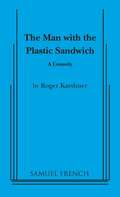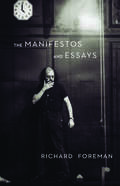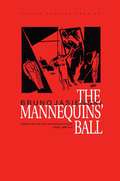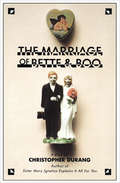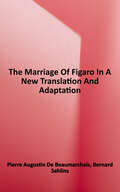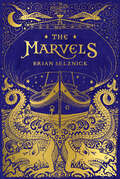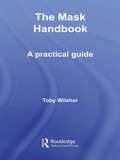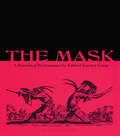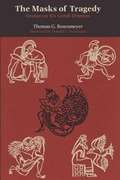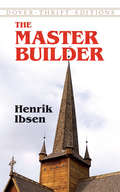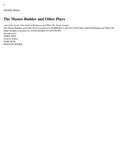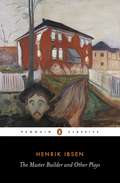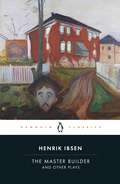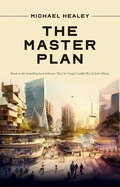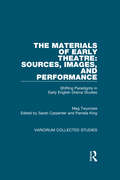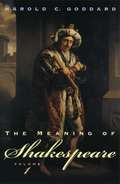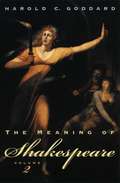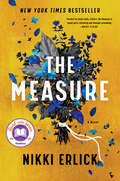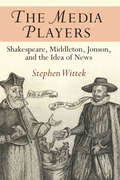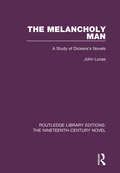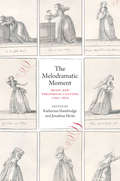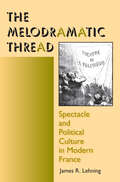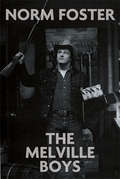- Table View
- List View
The Man with the Plastic Sandwich
by Roger KarshnerRoger Karshner. Comedy . Characters: 2 male, 2 female. Simple Exterior. Fired after twenty years, Walter Price encounters three provocative characters while contemplating his options on a park bench: Ellie, a high spirited ingenue who represents hope; Haley, a distinguished hobo representing wisdom; and Lenore, a hooker who represents reality. . "You will laugh until your sides feel as if they will burst, until your eyes begin to water, until you are sure that one more clever line or witty exchange will send you into a laughing fit from which you may never recover." - The Chicago Sun Times . "Truly high comedy...I can't think of a soul who wouldn't love the off beat characters." - Chicago Reporter/Progress Newspapers . "The best new dinner theatre play I've yet encountered." -Kansas City Star
The Manifestos and Essays
by Richard Foreman"Richard Foreman reinvented dialogue, action, sound, stage design, and philosophical groundwork as no other stage artist in our history."--PEN/Laura Pels Master American Dramatist Award citation These writings, collected from two earlier books now long out-of-print along with two recent interviews, provide a fascinating window into Richard Foreman's singular mind and creative process. Also included is The Gods Are Pounding My Head! (AKA Lumberjack Messiah), his last play before transitioning to more multi-media work. Richard Foreman has written, directed, and designed more than fifty of his own plays, both internationally and at his Ontological-Hysteric Theater, which he founded in 1968. He has received many OBIE awards, an NEA Lifetime Achievement Award, and a MacArthur "Genius" Fellowship.
The Mannequins' Ball
by Daniel Gerould Bruno JaslenskiThis play, by Futurist poet Bruno Jasienski, is an outstanding example of the joining of left-wing politics and avant-garde interest in human mechanization that characterized the experimental theatre of Poland in the inter-war years. Stalinism and the purges cut short Jasienski's career and prevented productions of his play for many years - except for a brilliant constructivist staging in Prague in 1933. The Mannequins' Ball can now take its place along with Capek's R.U.R. as one of the major twentieth-century dramas making use of the themes and techniques of human automata. Reproduced in this volume are the eight woodcuts by Moor which accompanied the original Moscow publication in 1931.
The Marriage of Bette and Boo (Books That Changed the World)
by Christopher DurangA painfully funny, Obie Award-winning play about the tragedy and comedy of family life.Never have marriage and the family been more scathingly or hilariously savaged than in this brilliant black comedy. The Marriage of Bette and Boo brings together two of the maddest families in creation in a portrait album of life’s uncertainties and confusion. Bereaved by miscarriages, undermined by their families, separated by alcoholism, assaulted by disease, and mystified by their priest, Bette and Boo, in their bewildered attempts to provide a semblance of hearth and home, are portrayed with a poignant compassion that enriches and enlarges the play, and makes clear why Christopher Durang has become one of the great names in American theater.“One of the most explosively funny American dramatists.”—Newsweek
The Marriage of Figaro: In a New Translation and Adapation
by Pierre A. De BeaumarchaisSensual gaiety is at the heart of this comic masterpiece which continues the merry tale of the little barber of Seville, a clever common man whose wits overcome his superiors who would suppress him. In paring down the number of players, presenting the scenes more economically, and offering a translation that removes archaic phrasing, Mr. Sahlins delivers a script that can be comfortably staged by present-day theatres.
The Marvels
by Brian SelznickDon't miss Selznick's other novels in words and pictures, The Invention of Hugo Cabret and Wonderstruck, which together with The Marvels, form an extraordinary thematic trilogy!A breathtaking new voyage from Caldecott Medalist Brian Selznick.Two stand-alone stories--the first in nearly 400 pages of continuous pictures, the second in prose--create a beguiling narrative puzzle.The journey begins at sea in 1766, with a boy named Billy Marvel. After surviving a shipwreck, he finds work in a London theatre. There, his family flourishes for generations as brilliant actors until 1900, when young Leontes Marvel is banished from the stage.Nearly a century later, runaway Joseph Jervis seeks refuge with an uncle in London. Albert Nightingale's strange, beautiful house, with its mysterious portraits and ghostly presences, captivates Joseph and leads him on a search for clues about the house, his family, and the past.A gripping adventure and an intriguing invitation to decipher how the two stories connect, The Marvels is a loving tribute to the power of story from an artist at the vanguard of creative innovation.
The Mask Handbook: A Practical Guide
by Toby WilsherThis book, from Europe’s leading Mask director and co-founder of the Trestle Theatre Company, provides a fascinating demystification of the process of using masks. Full of simple explanations, and collating over twenty-five years’ experience of writing for, directing and acting in masks, The Mask Handbook examines how masks have the ability to play the fundamental game of theatre – the suspension of disbelief. The Handbook includes: an introduction to the origin of masks advice on preparing, making and using masks tips on writing, devising and directing maskwork lots of fun and effective practical exercises. This accessible and inspiring handbook will empower teachers, directors and actors to fully explore the world of the mask.
The Mask: A Periodical Performance by Edward Gordon Craig (Contemporary Theatre Studies #Vol. 30.)
by Olga TaxidouNo study of modern theater is complete without a thorough understanding of the enormous influence of visionary genius Edward Gordon Craig. Born in England in 1872, Craig went on to become famous world-wide as an actor, manager, director, playwright, designer, and most importantly an author and theorist, whose books were translated into German, Russian, Japanese, Dutch, Hungarian, and Danish. Although an essential parallel to the European avant-garde, Craig was often read as "exceptional" and highly innovative in his native Britain, thus, The Mask not only appears as Craig's main cosmopolitan project but also at times functions as a surrogate stage for his experiments in theater practice. The book has a comprehensive chronology, extensive notes and a bibliography making it an essential text for undergraduates, postgraduates, actors, theatre professionals, designers, directors, researchers and writers in the fields of theatre studies (especially theater set and lighting) and theater history.
The Masks of Tragedy: Essays on Six Greek Dramas
by Thomas G. Rosenmeyer"What matters about a play is not the extent to which it is like any other play, but the way in which it is different," writes Thomas G. Rosenmeyer. "This is, I suggest, how the ancient audiences received the performances. . . . My purpose, then, in writing these essays is twofold: . . . to devote enough space to the discussion of each play to allow its special tone and texture to emerge without hindrance and at leisure . . . and to include in one collection analyses of plays so different from one another that the accent will come to rest on the variety of the tragic experience rather than on any one narrowly defined norm. " Greek tragedy is a vehicle for many different ideas and many different intentions. From the wealth of material that has come down to us the author has chosen six plays for analysis. He reminds us that the plays were written to be seen and heard, and only secondarily to be studied. The listeners expected each play to have a specific objective, and to exhibit its own mood. These the author attempts to recover for us, by listening to what each play, in its own right, has to say. His principal concern is with the tragic diction and the tragic ideas, designed to release certain massive responses in the large theater-going group of ancient Athens. In exploring the characters and the situations of the plays he has chosen, the author transports his reader to the world of fifth-century B. C. Greece, and establishes the relevance of that world to our own experience. The essays are not introductory in nature. No space is given, for instance, to basic information about the playwrights, the history of Greek drama, or the special features of the Attic stage. Yet the book addresses itself to classicists and nonclassicists alike. The outgrowth of a series of lectures to nonspecialists, its particular appeal is to students of literature and the history of Western thought. Parallels are drawn between the writings of the philosophers and the tragedies, and attention is paid to certain popular Greek beliefs that colored the tragic formulations. Ultimately, however, the approach is not historical but critical; it is the author''s intention to demonstrate the beauty and the craftsmanship of the plays under discussion. "What matters about a play is not the extent to which it is like any other play, but the way in which it is different," writes Thomas G. Rosenmeyer. "This is, I suggest, how the ancient audiences received the performances. . . . My purpose, then, in writing these essays is twofold: . . . to devote enough space to the discussion of each play to allow its special tone and texture to emerge without hindrance and at leisure . . . and to include in one collection analyses of plays so different from one another that the accent will come to rest on the variety of the tragic experience rather than on any one narrowly defined norm. " Greek tragedy is a vehicle for many different ideas and many different intentions. From the wealth of material that has come down to us the author has chosen six plays for analysis. He reminds us that the plays were written to be seen and heard, and only secondarily to be studied. The listeners expected each play to have a specific objective, and to exhibit its own mood. These the author attempts to recover for us, by listening to what each play, in its own right, has to say. His principal concern is with the tragic diction and the tragic ideas, designed to release certain massive responses in the large theater-going group of ancient Athens. In exploring the characters and the situations of the plays he has chosen, the author transports his reader to the world of fifth-century B. C. Greece, and establishes the relevance of that world to our own experience. The essays are not introductory in nature. No space is given, for instance, to basic information about the playwrights, the history of Greek drama, or the special features of the Attic stage. Yet the book addresses itself to classicists and nonclassicists alike. The outgrowth of a series of lecture...
The Master Builder (Dover Thrift Editions)
by Henrik IbsenFirst performed in 1892, this psychological drama is one of the great Norwegian playwright's most symbolic and lyrical works. The drama explores the insecurities of an aging architect, Halvard Solness, who suspects that his creative powers have diminished with age. Solness finds strength of purpose in his involvement with Hilda -- his muse, inspiration, and ardent believer in his greatness -- but their association leads to a conflict between heroic myth and complicated reality.Among the most original of Ibsen's works and one of his most frequently performed plays, The Master Builder is widely read by students of drama and literature as well as other readers. The play offers audiences a thought-provoking examination of the needs of the artist in relation to those of society and the limits of artistic achievement.
The Master Builder and Other Plays
by Henrik IbsenThis new Penguin Classics series of Henrik Ibsen’s plays will offer the best available editions in English of the great works by “the father of modern drama,” all under the general editorship of Ibsen scholar Tore Rem. All plays included here are newly translated and based on the recently published, definitive Norwegian texts. The Master Builder and Other Plays collects his last four plays: Little Eyokf, John Gabriel Borkman, and When We Dead Awaken, in addition to the title play.
The Master Builder and Other Plays
by Henrik IbsenThe four plays in this volume, written late in Ibsen's career as a dramatist, move away from his earlier preoccupation with people at odds with society to instead explore the inward struggle with their own thoughts, feelings and dreams. The Master Builder (1892) depicts a powerful man whose illusions collapse in the face of a young woman's courageous common sense. In Rosmersholm (1886), an idealist is forced to question his beliefs and confront terrible truths about the past, while Little Eyolf (1894) portrays a man's self-deception, which brings both tragic repercussions for his family and new hope for their future. And in John Gabriel Borkman (1896), a dying woman returns to reclaim the affections and loyalty of her nephew, resulting in a bitter struggle with her sister.
The Master Builder and Other Plays
by Henrik IbsenIbsen's greatest late plays in superb modern translations, part of the new Penguin Ibsen series. This volume includes The Master Builder, Little Eyolf, John Gabriel Borkman and When We Dead Awaken - Ibsen's last four plays, written in his old age in Oslo. In The Master Builder, a married, middle-aged architect becomes bewitched by a strange young woman who claims to have known him for years. A sudden death in Little Eyolf is the catalyst that drives a couple into a greater understanding of themselves. In John Gabriel Borkman, a banker recently released from prison must choose between his wife and her sister, while a sculptor on holiday is reunited with the woman who inspired his greatest art in When We Dead Awaken. The new Penguin series of Ibsen's major plays offer the best available editions in English, under the general editorship of Tore Rem. All the plays have been freshly translated by leading translators and are based on the definitive Norwegian edition of Ibsen's works. This volume includes an introduction by Toril Moi on the themes of death and human limitation in the plays, and additional editorial apparatus by Tore Rem. Henrik Ibsen (1828-1906) is often called 'the Father of Modern Drama'. Born in the small Norwegian town of Skien, he left Norway in 1864 for a twenty-one-year long voluntary exile in Italy and Germany. After successes with the verse dramas Brand and Peer Gynt, he turned to prose, writing his great twelve-play cycle of society dramas between 1877 and 1899. This included The Pillars of Society, A Doll's House, Ghosts, An Enemy of the People, The Wild Duck, Rosmersholm, The Lady from the Sea, Hedda Gabler, The Master Builder, Little Eyolf, John Gabriel Borkman, and, finally, When We Dead Awaken. Ibsen returned to Norway in 1891 and died there at the age of seventy-eight. Barbara J. Haveland and Anne-Marie Stanton-Ife are both freelance literary translators. Toril Moi is Professor of English, Theater Studies and Philosophy at Duke University. Her books include Henrik Ibsen and the Birth of Modernism (2006). Tore Rem is Professor of British literature at the University of Oslo and author of Henry Gibson/Henrik Ibsen (2006).
The Master Plan
by Michael HealeyIn 2017, when the public agency Waterfront Toronto decided to put up a parcel of land for development, Sidewalk Labs, a subsidiary of Google’s Alphabet Inc., swept in with a proposal to create the city of the future. Waterfront Toronto jumped at the opportunity to advance housing sustainability and affordability by exploring Alphabet’s innovative technology and data-driven techniques. But the project quickly started to fall apart from uneasy partnerships, sclerotic local politics, and an overwhelmingly negative public response.In this biting comedy about the failure to build a smart city in Toronto, Michael Healey lampoons the corporate drama, epic personalities, and iconic Canadian figures involved in the messy affair between Sidewalk Labs and Waterfront Toronto. Based on the bestselling exposé, Sideways: The City Google Couldn't Buy by Josh O’Kane, The Master Plan exposes the hubris of big tech, the feebleness of government, and the dangers of public consultation with sharp wit and insightful commentary.
The Materials of Early Theatre: Shifting Paradigms in Early English Drama Studies (Variorum Collected Studies)
by Meg TwycrossCollected Studies CS 1068 The essays selected for this volume are chosen to reflect the important and intersecting ways in which over the last forty years Meg Twycross has shifted paradigms for people reading early English religious drama. The focus of Meg Twycross’s research has been on performance in its many aspects, and this volume chooses four of the most important strands of her work - the York plays; new ways of understanding acting and performance in late medieval theatre, particularly in Britain and across Europe; why scenes are staged in the ways they are, verbally and by extrapolation visually, by close reading of texts against the background of medieval theology; and the attention paid to wider contexts of medieval theatre - concentrating especially on essays that are not easily available today. These thematic strands are reflective of Meg Twycross’s major contribution to the field. They also represent those areas from her wider work which will have most utility and value for those, whether students or senior specialists in areas beyond early drama, who are looking for ways into understanding English medieval plays. The crucial work that has been done here has opened new perspectives on late medieval theatre, and will allow new generations to begin their study and research from further along the road.
The Meaning Of Shakespeare Volume 1
by Harold C. GoddardIn two magnificent and authoritative volumes, Harold C. Goddard takes readers on a tour through the works of William Shakespeare, celebrating his incomparable plays and unsurpassed literary genius.
The Meaning of Shakespeare (Volume II)
by Harold C. GoddardIn two magnificent and authoritative volumes, Harold C. Goddard takes readers on a tour through the works of William Shakespeare, celebrating his incomparable plays and unsurpassed literary genius.
The Measure: A Novel
by Nikki ErlickINSTANT NEW YORK TIMES BESTSELLER - The Read With Jenna Today Show Book Club Pick!"A story of love and hope as interweaving characters display: how all moments, big and small, can measure a life. If you want joy, love, romance, and hope—read with us." —Jenna Bush Hager A luminous, spirit-lifting blockbuster that asks: would you choose to find out the length of your life?Eight ordinary people. One extraordinary choice.It seems like any other day. You wake up, drink a cup of coffee, and head out.But today, when you open your front door, waiting for you is a small wooden box. The contents of this mysterious box tells you the exact number of years you will live.From suburban doorsteps to desert tents, every person on every continent receives the same box. In an instant, the world is thrust into a collective frenzy. Where did these boxes come from? What do they mean? Is there truth to what they promise?As society comes together and pulls apart, everyone faces the same shocking choice: Do they wish to know how long they’ll live? And, if so, what will they do with that knowledge?The Measure charts the dawn of this new world through an unforgettable cast of characters whose decisions and fates interweave with one another: best friends whose dreams are forever entwined, pen pals finding refuge in the unknown, a couple who thought they didn’t have to rush, a doctor who cannot save himself, and a politician whose box becomes the powder keg that ultimately changes everything.Enchanting and deeply uplifting, The Measure is an ambitious, invigorating story about family, friendship, hope, and destiny that encourages us to live life to the fullest.
The Media Players
by Stephen WittekThe Media Players: Shakespeare, Middleton, Jonson, and the Idea of News builds a case for the central, formative function of Shakespeare's theater in the news culture of early modern England. In an analysis that combines historical research with recent developments in public sphere theory, Dr. Stephen Wittek argues that the unique discursive space created by commercial theater helped to foster the conceptual framework that made news possible. Dr. Wittek's analysis focuses on the years between 1590 and 1630, an era of extraordinary advances in English news culture that begins with the first instance of serialized news in England and ends with the emergence of news as a regular, permanent fixture of the marketplace. Notably, this period of expansion in news culture coincided with a correspondingly extraordinary era of theatrical production and innovation, an era that marks the beginning of commercial theater in London, and has left us with the plays of William Shakespeare, Ben Jonson, and Thomas Middleton. Book jacket.
The Melancholy Man: A Study of Dickens's Novels (Routledge Library Editions: The Nineteenth-Century Novel #25)
by John LucasFirst published in 1980, this book surveys Dickens’ growing power to drive deep into the causes of his contemporary conditions. It reveals the importance of nature to Dickens as a rich metaphor of human freedom and potentiality, and emphasises his concern with time and the problems of freedom. The author considers the peculiarity of Dickens being unanimously acclaimed as a great writer considering the difficulty in placing him definitively within the literary tradition. The author argues Dickens was an isolated figure, indifferent to changing fashions and with a strong sense of the dignity of human nature and that this formed the basis of his character and writings.
The Melodramatic Moment: Music and Theatrical Culture, 1790–1820
by Jonathan Hicks Katherine HambridgeWe seem to see melodrama everywhere we look—from the soliloquies of devastation in a Dickens novel to the abject monstrosity of Frankenstein’s creation, and from Louise Brooks’s exaggerated acting in Pandora’s Box to the vicissitudes endlessly reshaping the life of a brooding Don Draper. This anthology proposes to address the sometimes bewilderingly broad understandings of melodrama by insisting on the historical specificity of its genesis on the stage in late-eighteenth-century Europe. Melodrama emerged during this time in the metropolitan centers of London, Paris, Vienna, and Berlin through stage adaptations of classical subjects and gothic novels, and they became famous for their use of passionate expression and spectacular scenery. Yet, as contributors to this volume emphasize, early melodramas also placed sound at center stage, through their distinctive—and often disconcerting—alternations between speech and music. This book draws out the melo of melodrama, showing the crucial dimensions of sound and music for a genre that permeates our dramatic, literary, and cinematic sensibilities today. A richly interdisciplinary anthology, The Melodramatic Moment will open up new dialogues between musicology and literary and theater studies.
The Melodramatic Thread: Spectacle and Political Culture in Modern France (Interdisciplinary Studies in History)
by James R. Lehning“This ambitious undertaking is concerned with the melodramatic form in theatre and film and its impact on French political culture.” —H-France ReviewIn France, both political culture and theatrical performances have drawn upon melodrama. This “melodramatic thread” helped weave the country’s political life as it moved from monarchy to democracy. By examining the relationship between public ceremonies and theatrical performance, James R. Lehning sheds light on democratization in modern France. He explores the extent to which the dramatic forms were present in the public performance of political power. By concentrating on the Republic and the Revolution and on theatrical performance, Lehning affirms the importance of examining the performative aspects of French political culture for understanding the political differences that have marked France in the years since 1789.“In this thoroughly researched and persuasive book, Lehning provides a fascinating reading of public performances in modern France . . . This is an important contribution to the study of French culture and the democratization process . . . Essential.” —Choice“Lehning’s application of the themes of melodrama to French political culture offers new insights into French history. His style is lively, clear, and highly readable.” —Venita Datta, Wellesley College“The analyses in this book make a real contribution to debates about the ways in which art, particularly popular art, and politics interact; how politics itself is theatrical in the French case; and the role of ritual in politics and the function of politics as ritual and ceremony.” —John Gaffney, Aston University
The Melville Boys
by Norm FosterA relaxing weekend trip full of fishing, football, and beer is on the agenda for the Melville brothers. Unfortunately, so is confronting eldest brother Lee's terminal illness. But weekend plans are suddenly thrown for a loop when the boys meet two attractive sisters, who inadvertently change more than just their agenda. In this modern Canadian classic, Norm Foster offers a lighthearted comedy full of vigour about brotherhood and the unexpected.
